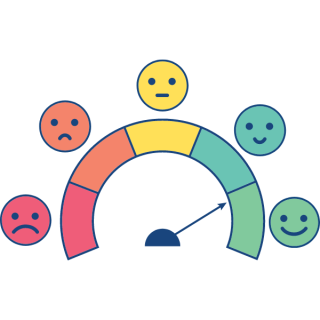Emotions
What Is Emotional Well-Being, and How Do We Get It?
Five steps towards positive emotional well-being.
Posted February 28, 2024 Reviewed by Davia Sills
Key points
- Emotional well-being refers to the quality of someone's emotional experiences and how they affect their life.
- Positive emotional well-being is something a person can work towards and maintain.

On January 30, the popular Sesame Street character Elmo was nice enough to ask everyone how they were doing. Elmo and his friends from Sesame Street probably did not realize what would happen next. Thousands of people replied to his tweet with an outpouring of concern and despair. The replies covered everything from personal woes, such as broken relationships and lost jobs, to deep despair about climate change. In response to the outpouring, Elmo kindly offered a link to a mental health helpline and some compassion for his followers. #EmotionalWellBeing was important, Elmo stated, and that is his hope for everyone.
So, let’s talk about what exactly emotional well-being is, what it looks like, and how to achieve it.
Emotional well-being can be defined as “the emotional quality of an individual’s everyday experience, including the frequency and intensity of the experience of joy, stress, sadness, anger, and affection that make one’s life pleasant or unpleasant.” While this definition doesn’t distinguish positive emotional well-being from negative emotional well-being, let’s assume that Elmo’s desire for us all is to have positive emotional well-being, and we can focus our discussion on that.
Here are five questions to ask yourself to figure out if your emotional well-being could use some improvement, as well as some tips for how to achieve that.
1. Monitor how much you complain.
We all have our moments, our bad days, and our bad seasons of life. Our circumstances are not always within our control, but the ways in which we respond to them can make a big difference. If you notice that you are making many more negative statements about your circumstances, your relationships, or just anything that you find unpleasant, your tendency to focus on the negative is going to affect your emotional well-being.
If your friends and loved ones have told you that you complain a lot, listen to them before you become defensive. If you only view the world through a negative lens, you won’t have a very nice view. It becomes harder to identify positive experiences when people profoundly focus on what is wrong with their lives.
2. Intentionally acknowledge what is positive in your life.
Feeling good and maintaining emotional well-being involves more than just the absence of complaining and negative thinking. It also involves the awareness of what is going well in your life or the things that you consider to be good. This doesn’t always have to be major achievements or life events. Positive aspects of your life might include your pets, your friends, your steady income, your hobbies, basically anything that gives you joy.
Sometimes, when life seems harder, we forget to acknowledge what is positive. But it’s important to do so, to speak it out loud, and to reflect on being grateful for what we have. This act reminds your brain that life is not all bad all the time.
3. Surround yourself with loving, kind people.
Some of us are born into big, happy families who consistently care about each other. Many of us are not so fortunate. But as we become adults, we can choose who we spend time with and who we prefer to keep around for companionship and support.
Spend some time noticing how others around you behave. When you are with them, notice how you feel. Do you leave their presence feeling uplifted, hopeful, and supported? If so, you definitely want to keep that person as a part of your life. But if you notice you’re starting to feel more pessimistic, your thoughts and emotions are more negative, or you feel really stressed, you want to consider whether this relationship should be permanent.
Everyone has bad days, so you don’t want to abandon people who are going through a hard time. But if you notice yourself regularly feeling discouraged or burdened after spending time with them, perhaps consider if you should do anything about it. This is especially true if most of your friends or the people who are in your life are unable to support you or make you feel good about yourself. We want people who are rooting for us and who can bear our pain as well as expecting us to endure theirs.
4. Refrain from comparing your circumstances to those of others.
Social comparison can destroy emotional well-being. Scrolling through social media posts—wondering why some people lead such great lives, why some people are so beautiful and put together, and how some people never seem to struggle—creates a distorted reality about how well other people are doing. Remember that some people prefer to put their best images out on social media while keeping the rest of their lives private.
Also, remember that you do not know what goes on in other people’s lives unless they tell you. When you find yourself wishing you had someone else’s life because you saw their Instagram posts, catch yourself and say something like, “Good for them. I hope they’re happy.” Then, keep scrolling.
5. Evaluate when you need to make changes.
People who do not reflect on how their life is going often end up lacking emotional well-being. They find themselves stuck in a rut, and they are not aware of how it happened or what to do about it. It is important to consistently reflect on how your life is going. For instance, whether or not your job or career is satisfactory, whether you like where you’re living, whether you have enough emotional support through friends and family, and how much you are enjoying your life. Reflecting on your circumstances allows you to identify what is going well in your life so you can be grateful and also what needs to change. Identifying the problems is the first step in making changes that result in good mental health and emotional well-being.
Emotional well-being won’t just happen on its own. You have to be proactive to cultivate and maintain your positive emotional well-being.
References
Kahneman D, Deaton A. High income improves evaluation of life but not emotional well-being. Proc Natl Acad Sci U S A. 2010 Sep 21;107(38):16489-93. doi: 10.1073/pnas.1011492107. Epub 2010 Sep 7. PMID: 20823223; PMCID: PMC2944762.




